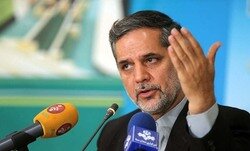Iranian MP says U.S. military coalition in Persian Gulf has failed

TEHRAN – Spokesman for the Iranian Parliament’s National Security and Foreign Policy Committee said on Wednesday that the so-called military coalition in the Persian Gulf proposed and led by the U.S. failed at its first step.
“The U.S. plan for the Persian Gulf has definitely failed because a (large) number of countries did not welcome it,” Seyed Hossein Naqavi Hosseini said.
He further said that Iran believes that settling differences in the region is not indebted to military tensions, foreign meddlesome and trans-regional forces’ deployment in the region.
“Security concerns in the Persian Gulf must be solved via dialogue among regional countries,” the MP pointed out, adding, “That is why Tehran welcomed Saudi Arabia’s negotiations offers to restore security and tranquility in the Persian Gulf. We believe that the regional nations should resume close dialogue to achieve unity of view.”
“The Iranian president’s Hormuz Peace Initiative’s main core is negotiations among regional states through which we hope to materialize the plan’s goals,” Naqavi Hossein further said.
President Hassan Rouhani has proposed a regional security plan for the Persian Gulf, tentatively called the "Hormuz Peace Initiative.”
The idea entails the concerned countries cooperating to ensure security in the Persian Gulf and Sea of Oman, though importantly excluding the U.S. participation which is stirring up regional tensions.
Washington blamed Tehran for the mysterious tanker attacks that occurred earlier in the summer and the Houthis' recent drone strike against the world's largest oil processing facility in Saudi Arabia, which the U.S. then exploited as the justification for bolstering its military presence in the Persian Gulf in order to “milk” Saudi Arabia.
As part of its efforts, the U.S. has struggled to form an international coalition for patrolling the regional waterways to supposedly ensure "freedom of navigation," a move that Iran has labeled as provocative primarily intended to bully Tehran. It's therefore imperative for the regional nations to take security into their own hands instead of relying on self-interested outsiders like the U.S. which have over four decades of experience in trying to destabilize Iran after its 1979 Islamic Revolution.
MJ/PA
